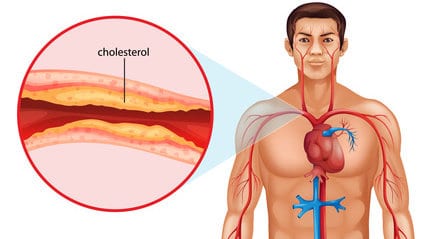Cholesterol Control
Improve Your Heart Health

What is Cholesterol?
Cholesterol is a soft, waxy substance present as the main structural component of the cell membrane of every cell in the body. Although the body uses cholesterol while making blood cells too much cholesterol can cause health problems and increase the possibility of heart disease.
If a patient has high cholesterol levels, fatty deposits begin to collect in the blood vessels. These deposits can prohibit the flow of blood through the arteries. When this occurs, enough oxygen may not reach the heart of the brain. Lower oxygen levels in the blood can cause heart attacks or strokes.
High cholesterol can be caused by either genetics or an unhealthy lifestyle. This medical condition is highly preventable and treatable. Patients who follow a healthy diet and exercise regularly may be able to manage high cholesterol without the need of medications. There are no symptoms of high cholesterol; however, a simple blood test is all that is needed to diagnose elevated levels.

Causes of High Cholesterol
Risk factors include obesity, smoking, high saturated fat diets, genetics, and a sedentary life style. Other factors such as mental stress, increased coffee intake, and changes to body weight may impact cholesterol levels.
Cholesterol does not dissolve in the blood and needs to be transported by lipoproteins. The most popular and influential varieties are LDL and HDL. Low-density lipoprotein or LDL is the main cholesterol carrying compound in the blood. Commonly known as the “bad” cholesterol, it builds up inside the blood vessel walls in the form of plaques. These plaques block arteries and can restrict blood flow to the heart. If the plaques burst the contents spill out forming clots that travel around the body in the blood stream resulting in strokes or heart attacks. High-density lipoprotein or HDL carries excess cholesterol and transports it to the liver to be metabolized. It protects the body and reduces the chances of a heart attack and is commonly known as the “good” cholesterol.
Hydrogenated oils (hardened by hydrogenation to make them more solid e.g. margarine) change fatty acids into trans-fatty acids, thereby increasing LDLs and reducing HDLs.

Functions of Cholesterol
Despite its bad publicity, cholesterol is an essential substance the body needs to survive. It serves as the structural basis of bile salts, steroid hormones, vitamin D and (cell) plasma membranes. It provides the myelin lining to our nerve fibers. It is needed for the production of adrenal and sex hormones and essential to normal hormone function and brain health. Therefore, it is important not to rid the body of cholesterol but rather prevent excessive cholesterol and balance the ‘good’ against the ‘bad’.

Prevention of High Cholesterol
There are a number of things that can be done to help regulate cholesterol naturally such as-
- Healthier dietary choices
- Regular aerobic exercise which speeds up the heart rate lowering LDL and increasing HDL
- Reducing stress levels
- Taking certain natural supplements.

Dietary Tips
Cholesterol control can be achieved with the right treatment and a few changes to your diet.
- Avoiding consumption of animal foods containing saturated fat reduces cholesterol and has been reported to reverse existing heart disease
- Avoid trans fatty acids (found in many processed foods containing partially hydrogenated oils)
- Increase consumption of Omega-3 fatty acids (from cold-water fish) which lower triglycerides and cholesterol levels, and increase HDL
- Increase high-soluble fiber foods like beans, oats, psyllium seed, glucomannan, and fruit pectin
Take charge of your health and learn how you can manage your cholesterol levels in a safe and healthy way.

Ready to manage your cholesterol in a safe and healthy way?
Our integrative practitioners and nutritionists can assist you with cholesterol control. Call us at (833)767-3935
